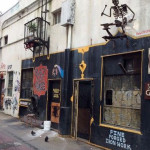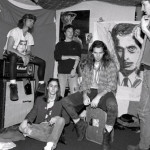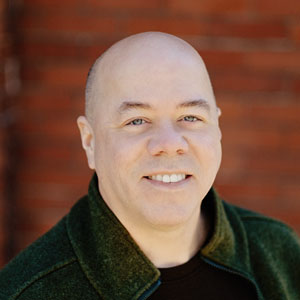Former Pearl Jam practice space, Black Dog Forge getting the boot out of Belltown
May 24, 2017, 5:46 PM | Updated: 6:05 pm
Belltown’s Black Dog Forge and its legendary basement rehearsal space is being closed so the building can be put up for sale, building tenants confirmed.
Black Dog has looked out on the alley of the 2300 block between 2nd and 3rd Avenues for 25 years. Seattle music legends Pearl Jam, Soundgarden, Presidents of The United States of America and The Briefs all practiced here.
RELATED: Pearl Jam officially inducted into the Rock and Roll Hall of Fame
Co-owner Louie Raffloer said he was told last Thursday they have two months to vacate the building. As it turned out, it was the first of two pieces of awful news he received that day.
“‘Two months,’ he told us,” said Raffloer, who co-owns Black Dog with Mary Gioia. “(I) nearly threw up everything. We were standing in the middle of 25 tons of art supplies. We were very nauseous about that. Shoot eight hours later, Chris Cornell hangs himself.
“That Thursday was pretty brutal around here.”
The Black Dog and the rehearsal space — a windowless 30-foot room down a set of stairs below the forge — are two of the few remaining holdouts from Belltown’s artistic, musical, blue-collar, two-story past when, as Raffloer put it, rent was cheap and every building had a story to shout.
“At the time in Belltown, there were bands making noise coming out of windows on every block,” he said. “There were clubs that blared music out to the street. There was never a class of people that was here to be offended.”
Saving Black Dog Forge
Charity Drewery, who runs the Stalking Seattle tour, has started a GoFundMe campaign in an attempt to save Black Dog. As of Wednesday afternoon, the GoFundMe page had $2155 of its $4 million goal to help buy the building. In the campaign, Drewery called the space, “the first place Eddie (Vedder) was taken to when he came to Seattle to meet the guys.”
“Music fans from all over the world make the voyage to Seattle to walk down the same stairs Eddie Vedder describes in the movie, Pearl Jam 20,” Drewery wrote in her campaign pitch. “It was also shown and mentioned during Pearl Jam’s induction to the Rock & Roll Hall of Fame.”
The announcement that the forge and practice space must go is the latest in a long line of low-cost, low-slung buildings to be razed or targeted for redevelopment in a recently upzoned neighborhood that once was the heart of the Seattle music scene in the 1980s and 1990s. Charles Cross, Seattle music journalist and historian, said much of the city’s musical cultural heritage is being developed away.
The practice space Alice in Chains named an album after, “The Music Bank Sessions,” is long gone as are all four Belltown places Nirvana worked on its music, Cross said.
“What we have seen in Seattle over the last 30 years is a gentrification that has threatened every practice space in the city and virtually every music club,” Cross said, adding that almost every existing music venue in town is at risk. “The clubs that exist anymore are the ones that have yet to be developed.
“What upsets me as a historian and as a somebody who witnessed many of these moments is that these are a part of Seattle’s cultural legacy. I’m frustrated that a Mariner can retire and have a street named after him (while) there still is not a street in Seattle called ‘Jimi Hendrix Boulevard.'”
Not just about the music
But it would be a mistake to assume that the only loss here is practice space, noted one business owner.
Victoria Ptak, owner of Vain hair salons, said losing Black Dog from Belltown is much more than losing a couple of metal workers; its losing a great neighbor who cares about the well-being of the neighborhood.
“Louie helped emerging businesses like mine,” Ptak said. “When the roof caved in from wet snow at our original 2nd Avenue location, he climbed up there and shoveled the snow and saved my store.”
Raffloer and Gioia are looking to SoDo and places south for new space. He said he knew that someday the breakneck development would catch up to him as it has done to dozen of other places in Seattle. Still, he’d hoped for a little more that two-months notice.
Cross said the city should do something to note the places that mark how Seattle became an international music destination.
“Can we save every building in the city? Probably not,” he said.
“But should we put a plaque up at least and tell people what happened here? I think we should.”


















